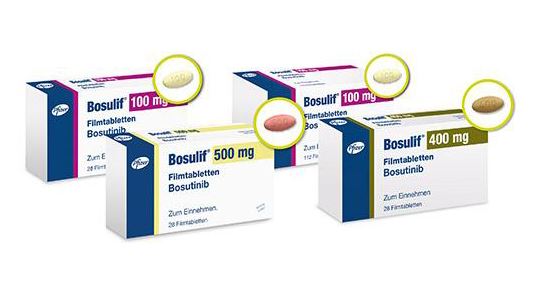Pfizer's second-generation targeted therapy for chronic myeloid leukemia, Bosulif (bosutinib), has been newly registered with the health insurance program this month.
A patient group welcomed the news and called for expanding its reimbursement to treat children.

Last Dec. 22, the Ministry of Health and Welfare unveiled a plan to raise drug prices to support the supply of essential drugs and strengthen coverage for treatments for severe diseases. It announced that four new drugs, including Bosulif, would be added to the health insurance list.
Accordingly, a special 5 percent calculation scheme for cancer patients will be applied, and patients who previously paid about 23.84 million won ($18,240) a year in drug costs will only have to pay about 1.24 million won.
"We welcome the inclusion of Bosulif in health insurance," the Korea Leukemia Patients Organization said in a statement on Wednesday. “However, Pfizer and the government should quickly improve the health insurance coverage standards, which are significantly reduced compared to the indications approved by the Ministry of Food and Drug Safety."
Bosulif was approved by the U.S. FDA on Sept. 3, 2012, as a second-generation targeted therapy for chronic myeloid leukemia in the same class as Sprycel (dasatinib), Tasigna (nilotinib), and Supect (radotinib).
It won the nod from the Ministry of Food and Drug Safety (MFDS) on Jan. 12, 2023, for an indication to “treat newly diagnosed chronic phase Philadelphia chromosome-positive chronic myeloid leukemia and chronic, accelerated, or acute phase Philadelphia chromosome-positive chronic myeloid leukemia patients resistant or intolerant to prior therapies,” landing in Korea 11 years after the FDA approval, being used as a first-line treatment for chronic myeloid leukemia in the country.
However, the criteria for coverage have been reduced compared to the indication approved by the MFDS.
To be eligible for coverage, Gleevec (imatinib) must be administered to patients with Philadelphia chromosome-positive chronic myeloid leukemia aged 18 years or older in chronic, accelerated, or blast phase who are resistant or intolerant to prior therapy with Gleevec. This excludes Bosulif's first-line indication and limits the age range to adults and older.
In response, the patient group called for the government and Pfizer to expand coverage.
"The age has been limited to adults 18 years and older, which means that children and adolescents 17 years and younger are not eligible for the benefit," the group said. "The benefit is also unavailable when used as a first-line treatment, and the prior therapy is limited to Gleevec, a first-line treatment. For the same reason, Sprycel, Tasigna, and Supect, approved and covered by the MFDS as first-line treatments, are excluded and cannot be covered by health insurance."
It then pointed out that the first-line treatment options for patients with newly diagnosed chronic myeloid leukemia (CML) are Gleevec, Sprycel, Tasigna, and Supect, and the choice of targeted therapy can have a significant impact on treatment outcomes and side effect management.
"We urge the government and Pfizer to expeditiously revise the coverage criteria to ensure that Bosulif is covered even when used as a first-line treatment, as the relevant societies agree that it should be given priority consideration in patients with heart and vascular disease or risk factors," the organization added.

